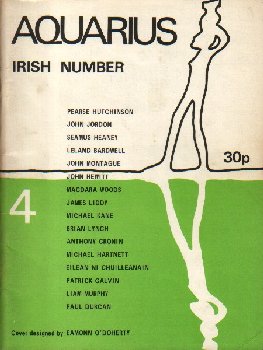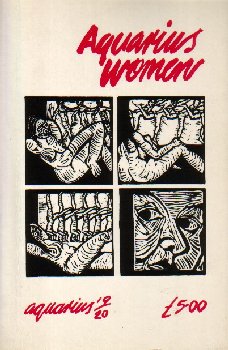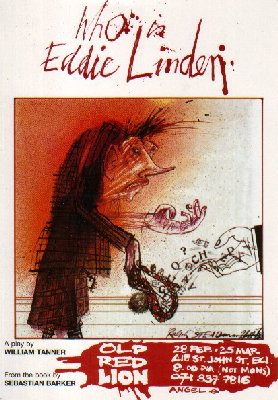| Devoted to the cause of poetry |  |
| Devoted to the cause of poetry |  |
| Poet Brian Patten has
described Eddie Linden as "one of the few antidotes
to the poison spread by various English Literary
Mafias", adding: "If Eddie did not exist, no
one would have dared to invent him". Elizabeth Smart, the author of By Grand Central Station I Sat Down and Wept, has written: Them I salute All who know him, or who have read Sebastian Barker's Who is Eddie Linden?, will know something of his Irish background. Of Tyrone and South Armagh parentage, 'illegitimate', adoped and reared in Scotland, he left school at fourteen, barely literate, to take up a succession of low-paid jobs, becoming a member of the Communist Party of Great Britain along the way. When I first met him, at a meeting of Pax Christi in 1967, he had abandoned the Communist Party, rejoined the Catholic Church and become a pacifist. He was then a student at Plater College, Oxford, but he soon dropped out and returned to London. He contributed greatly to my enjoyment of that period when I was ostensibly researching my never-completed PhD on the later career of Sir Charles Dilke. He threw immensely enjoyable parties in a Hampstead flat which he was caretaking and it was he who introduced me to Soho, to the company of a bohemian circle of English writers and to radical Catholicism. Eddie was, at times, a difficult person - he is recognisably the model for the character Sammy Giffen in Alan Sharp's novel The Wind Shifts. However, like many others, I owe him a debt of gratitude and I would wish to acknowledge that debt. The arrival of another issue of Aquarius - the first since 1987 - offers the opportunity of celebrating what has been Eddie's major achievement: the foundation and promotion, over many years, of a significant poetry magazine. The first issue, costing five shillings and with an attractive emblematic cover by Anna Mieke Lumsden, appeared in 1969. It contained Eddie's own 'City of Razors', which provided the title for the collection of his poems published by Jay Landesman in 1980. It also contained poems by forties poets including George Barker, John Heath-Stubbs, Tom Blackburn and Stevie Smith, as well as by a number of newer voices. John Heath-Stubbs was the best known member of the editorial team, which also included John Ezard, now a senior journalist with the Guardian. In 1971 the first special, or dedicated, issue appeared. This was an Irish issue edited by Pearse Hutchinson. A number of other issues have included dedicated Irish sections. Even when this was not the case, Eddie's increasingly close links with Ireland - especially from 1969 onwards when he became a regular visitor to the house of artists John Behan and Constance Short in Dublin - meant that the work of Irish poets was included in general issues of Aquarius. The list of Irish poets whose work has been featured reads like a roll-call of modern Irish poetic talent in the English language. It includes Leland Bardwell, Paul Durcan, Seamus Heaney, Madge Heron, Michael Longley, Derek Mahon, Medhb McGuckian, Paul Muldoon, Eiléan Ní Chuilleanáin, Eithne Strong, Matthew Sweeney, Shaun Traynor and Macdara Woods. The Irish issue was a prelude to other special numbers focusing on Scottish, Welsh, Canadian and Australian poetry. There were also special issues honouring John Heath-Stubbs and Hugh MacDiarmaid; and the most recent issue (1987) was dedicated to 'Poetry of the Forties'. Eddie has also involved artists in the magazine. To date, covers for Aquarius have been provided by John Behan, Fiona Green, Adrian Henri, Colm McGookin, Eamonn O'Doherty and Ralph Steadman, among others. George Barker designed a cover for an early special Welsh issue and the current issue comes with a cover by the Irish artist Constance Short. Eddie has maintained his controlling role as editor and publisher throughout. However, the running of the magazine by a committee and, later, the appointment of a guest editor for each edition had a number of advantages. For one thing, it has meant that the heavy weight of responsibility for rejecting other people's work never rested uniquely on the editor's shoulders. "The poems are chosen by a committee and therefore the rejection of any poem is also the responsibility of the committee," the reader is brusquely informed in the second issue. It has also made for variety. There have always been a number of points of access to publication in Aquarius and the taste and priorities of members of the editorial board, and later of guest editors, have varied. All of this has contributed to one of the magazine's most valuable characteristics - its abiding eclecticism. As Aquarius grew and the quality of design improved, costs of production increased. Eddie's focus on the magazine, his determination that it would survive, made him fertile in the location of the funding to support it. He freely acknowledges the help he has received in this area from many people, including Con Howard and Michael Longley. Aquarius had originally survived "by a series of minor miracles", and on subscriptions and donations from well-wishers. From 1973 public funding began to be acknowledged. The Scottish Arts Council, the Welsh Arts Council, the Greater London Arts Council, the Arts Council of Northern Ireland, the Irish Department of Foreign Affairs, the Canada Arts Council (Conseil des Arts du Canada), the Arts Council of Australia, the Irish Arts Council, the Arts Faculty Research and Publications Fund of Carleton University, Ottawa, Canada, have all contributed over the years. The special issues served as a device to access funding and the list of sponsors is a tribute to Eddie's persistance as a cultural entrepreneur. The prize for ingenuity in attracting funding goes to issue 15/16 (1983/84), "a special Australian edition, plus new Irish poetry and general section", which was assisted by the Arts Council of Australia, the Northern Ireland Arts Council, the Greater London Arts Association, the Irish Arts Council and the Department of Foreign Affairs in Dublin. In the less hospitable atmosphere of the eighties, however, even Eddie's ingenuity in finding new sources of funding was not enough to ensure the annual publication of the magazine. He dreamed of finding a millionaire. Paul Hamlyn, the millionaire publisher, came up with £500 in 1991. Then Brian Wilson, Labour MP for Cunninghame North, raised the question in the House of Commons. An Arts Council grant of £2000 resulted. These donations have enabled Eddie to go ahead with the current special issue on 'Contemporary Women's Writing', edited by Poetry Society chair Hilary Davies. Following the pattern of other issues, it includes the work of established and emerging writers. Among the former are Elspeth Barker, Carol Ann Duffy, Marilyn Hacker, Elizabeth Jennings, Eiléan Ní Chuilleanáin and Michèle Roberts. Poet Jeremy Reed contributes an essay on the work of Marilyn Hacker, the distinguished editor of the Kenyon Review, and Edna Longley is interviewed by Carol Rumens, whose work is also included. Eddie has been a member of the Council of the Poetry Society for many years and was elected to its executive in 1990. For him, ensuring the survival of Aquarius has been a personal crusade. It was most appropriate that Con Howard should have presented him with a finely bound copy of Aquarius - in green and gold - at his memorable 50th birthday party in 1985. It is no mean achievement to have founded and ensured the survival of a magazine of this quality and variety over twenty-three years, and over a recent period which has been a dismal one in terms of public funding for arts projects. 1994 will see the 25th anniversary of Aquarius. The best present that Eddie and Aquarius could receive would be the funding which would place the magazine, once more, on a firm basis as an annual publication. |
 |
 |
Published in The Irish Post, 5 December 1992.
 |